
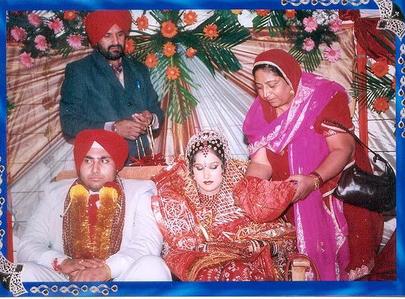
Pawandeep holds a framed photo of her sister. In the photo, Amandeep is wearing a pink salwar-kameez, a Punjabi dress. “She dreamed of a better life for herself and her family. All she wanted was to live happily with her husband and son like any other woman.”
I don’t even know where to begin with this story. The grisly facts of Amandeep Kaur Dhillon’s murder and her father-in-law’s arrest have been covered before, but this weekend, the Toronto Star’s Raveena Aulakh wrote a detailed story. You can read the full article here and it will break your heart, not just because of Amandeep Kaur’s tragic story, but because her story is all too common in our community.
Baldev Mutta knows the stories of immigrant women all too well.
The executive director of the Punjabi Community Health Centre in Brampton says hundreds of young Punjabi brides arrive in Canada every year. Many have arranged marriages. “They don’t know anyone, don’t have any support system and battle pressures most people can’t even imagine exist,” he said.
In the Punjabi culture, men are raised to be dominant while women are expected to be subservient. “The level of thinking of men in the Punjabi community leaves a lot to be desired,” said Mutta, a Punjabi himself. Mutta, who runs programs at four Sikh temples in Brampton, Rexdale, Malton and Oakville, and hosts a radio show, wishes he had been able to reach Amandeep.
Some women are so isolated that they are not allowed to have any communication even with their parents, said Kripa Sekhar, executive director of the South Asian Women’s Centre on Lansdowne Ave. in Toronto. “There are times when we get emails or phone calls from a woman’s family saying they haven’t heard from her ever since she came to Canada, can we check on her,” says Sekhar.In some cases women, bruised and beaten, have been locked up in their homes, not allowed to make or receive any calls. “It’s a problem women face everywhere, but what is unique among South Asians is that we don’t acknowledge it or want to talk about it.”
We can deny it all we want but here’s the sad reality for many (not all) Punjabi families:
Continue Reading »
One Afghani woman has had enough. And her story has struck a chord with many Indian woman who are now supporting her struggle to hold accountable an Indian Army doctor who married and abandoned her in Kabul after three weeks of marriage. Major Pant eventually called her, after returning to India, to tell her he was already married and had two children.
Twenty-year-old Sabra Ahmadzai finished her final high school test in Afghanistan, took out a bank loan and then flew to India on the last day of November. She came to look for an Indian army doctor who she said had deceived, married and then abandoned her in Kabul, making her an object of shame and ridicule.
In India, Ahmadzai’s journey has become a rallying point for young women across college campuses who find in her a source of inspiration to question powerful hierarchies of traditional societies. The students in three universities in the capital are trying to set up a “Justice Committee for Sabra” by enlisting eminent lawyers, retired judges, professors and independent activists. [Washington Post] (emphasis added).
She had been pressured by her family and community to marry Major Pant who had been stationed in the medical hospital in Kabul. He was twice her age. Pant approached her family three times with marriage proposals. When her mother turned him away for not being Muslim, he returned with a priest who would convert him to Islam.
“I did not love him. He was my boss and twice my age. But the elders and the priest said, ‘We have given our word and cannot take it back,’ ” she recalled. “He had won their hearts by treating sick children of my relatives, too. They liked him. I followed their wishes obediently.” [Washington Post]
What’s striking are the layers of abuse that Ahmadzai is fighting against- from the marriage coerced by her community to a man twice her age, her battle to hold accountable an Indian army doctor for his lies and manipulation, to the stigma imposed on her as an abandoned bride. Ahmadzai has responded to the stigma by confronting the doctor who manipulated her. I’d be curious to know how she feels about the pressures from her own community, which journalists haven’t questioned her about. For now, Ahmadzai is at least confronting the Indian army doctor to regain, or perhaps gain for the first time, power and control over her own life.
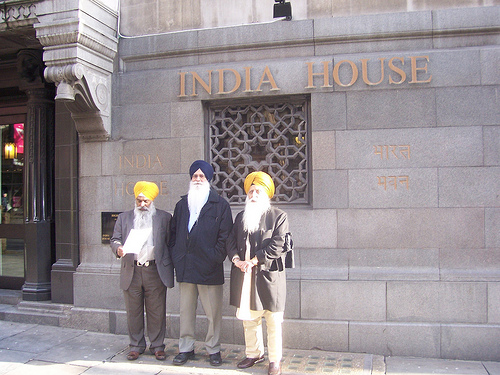 In the previous post, I had summarized a Stratfor report on the strong possibility of an Indian strike on Pakistan. Some Sikh groups in the UK, recently, released a formal appeal asking the Indian government to remove Indian nukes from the Punjab territory. Additional copies were given to the Pakistani embassy as well as the UN Security Council through the French Embassy. These Sikh groups have correctly surmised that East Punjab’s geography places it on the frontline of any conflict between India and Pakistan.
In the previous post, I had summarized a Stratfor report on the strong possibility of an Indian strike on Pakistan. Some Sikh groups in the UK, recently, released a formal appeal asking the Indian government to remove Indian nukes from the Punjab territory. Additional copies were given to the Pakistani embassy as well as the UN Security Council through the French Embassy. These Sikh groups have correctly surmised that East Punjab’s geography places it on the frontline of any conflict between India and Pakistan.
While news of the appeal has been reported in some Sikh media outlets, it is interesting that the mainstream Pakistani press has also picked up the report. The influential English-language Dawn writes:
The Sikhs maintain that they are not a party to the Indo-Pak dispute and, as non-combatants in the event of a war between the nuclear rivals, their population centre and homeland should not face what military experts have said is the likely outcome – a theatre of war in Punjab which becomes a nuclear conflict causing horrific casualties on a massive scale.[link]
Although the Hothi murder has been covered by my fellow Langa(w)riters, the case has re-appeared in the news.
To catch everyone up, in 2007 Gurparkash Singh Khalsa is alleged to have killed Ajmer Singh Hothi in Stockton, after he felt “dishonored” by a relationship and possible aborted pregnancy between Hothi and his daughter.
Khalsa is now behind bars in a San Joaquin prison. In the latest twist, the Times of India reports “Sikh Man slapped with USD 15million lawsuit.” (Why his religion is relevant, I am not sure as even the article in the Stockton Record is only “Victim’s family sues suspect in honor killing“, but I digress).
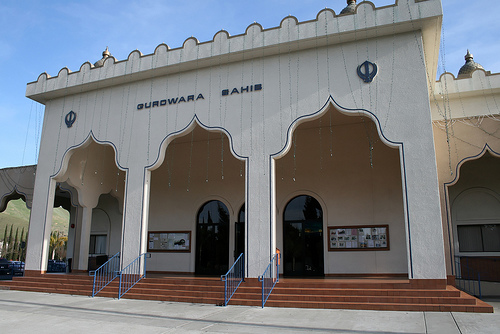 The city of Fremont in the Bay Area probably doesn’t need much introduction for most California Sikhs. A turn onto Gurdwara Road takes one into the residential area that houses the famous Fremont Gurdwara. A site of community energy, it has also been sporadically the site of community violence. Still the story of the Sikhs in Fremont is just one of Fremont’s stories.
The city of Fremont in the Bay Area probably doesn’t need much introduction for most California Sikhs. A turn onto Gurdwara Road takes one into the residential area that houses the famous Fremont Gurdwara. A site of community energy, it has also been sporadically the site of community violence. Still the story of the Sikhs in Fremont is just one of Fremont’s stories.
From a sleepy white city of 23,000, Fremont has become the Bay Area’s fourth largest city with a population of over 200,000 and an Asian-majority. The city is home to the largest Afghan population in the US. The city has a prominent role in Khaled Hosseini’s Kite Runner movie and novel, as many Afghans came to this city following the violence in their homeland during the Soviet invasion in 1979. My own experience with the Afghans living there was limited to the Afghan-Punjabi youth violence during the early/mid 1990s.
Just when you think that everything is hunky-dory for Sikhs in Canada, you hear of an incident like this that makes your cringe. Here’s a first-hand account of an incident that took place at the Toronto Raptors game last Friday night.
My brother, Gagandeep Singh Saluja and I, Simran Kaur Saluja attended a Raptors game at the Air Canada Centre on the night of Friday, January 30, 2009. I witnessed something which disturbed me tremendously. After a great night of getting two of the Raptors’ players to sign our jerseys and getting Jermaine O’Neal’s wristband, my brother and I make our way out to see the post-game show.
He tells me he has to use the washroom. Entering a public washroom is not unlawful in any way. I witnessed many people entering and exiting the same washroom my brother wished to use. A security guard approached my brother, out of all people as he is a visible minority that stands out. The security guard told my brother to get out. For what reason? Well, let me describe my brother to you all. He is a third-year student studying Business Management at UTSC and a proud Sikh youth who wears his turban with pride and joy…A huge Raptors’ fan as well. Gagan asks him “for what” while he tries to make his way to a stall and the security guard starts pushing him and saying “You don’t want to start with me!” He then calls back-up. Gagan finds himself with 4 to 5 security guards on him trying to kick him out. Police officers get involved during this time and start tackling him.
I sensed something wrong while I was standing outside watching the post-game show. I was hesitant in terms of if I should check on my brother in the washroom but I thought it wouldn’t be appropriate for me to do that. I decided to wait for him as I thought that the security guard had let him use the washroom. I wait for about 10 minutes for my brother…I was getting a bit edgy and started looking around for him. I had not seen anything.
Later, the security guard is out of breath and sweaty and attends to the location where I had seen him prior to the whole washroom catastrophe. I ask him “Aren’t you the one who was in the washroom?” He said “yeah.” He knew that I was there waiting for Gagan and after another 10 minutes he tells me, “You might want to make your way out as to whoever you were with is being arrested.” I race outside to find my brother without his turban on, in pain and suffering. When I saw his face…I don’t know how to explain such regret. I keep thinking to myself ‘had I gone into the washroom?! Maybe, just maybe they would not have used such force against him.’ I love my brother a whole lot and I never want to see him hurt. This whole ordeal that happened in Toronto, Canada out of all places is just sad.
 A new Gurbani search engine has become available for Mac users on their i-paraphernalia [hat tip, Sikhnet]. SikhiToTheMax debuted a PC-compatible version a while ago, but now Mac users can also search through SGGS Ji, Dasam Granth, and portions of Bhai Gurdas Vaar on iPhone/Touch. Not having to jailbreak your hardware is a pretty sweet incentive.
A new Gurbani search engine has become available for Mac users on their i-paraphernalia [hat tip, Sikhnet]. SikhiToTheMax debuted a PC-compatible version a while ago, but now Mac users can also search through SGGS Ji, Dasam Granth, and portions of Bhai Gurdas Vaar on iPhone/Touch. Not having to jailbreak your hardware is a pretty sweet incentive.
If you’d like to help the iSikhi team continue to develop the product (or would like to help them finance its development), see below. The app is downloadable at http://www.isikhi.com.
Announcement from iSikhi.com: … the ice is broken and iSikhi is now available.
We’re already working on the next version with punjabi keyboard support that is ready for submission. We would really appreciate your feedback, suggestions, and support at our forums on iSikhi.com.
Donations are welcome as well and will be used to support the iSikhi project. Thanks – iSikhi Team
We have often heard about the Sikh regiment in the British and Indian Armies. Recently, the Gurkhas, a South Asian group, who also has made-up a large portion of the British Army, are seeing a U-turn in an earlier policy that did not allow Gurkhas soldiers to settle in Great Britain.
The Tribune reports:
In a U-turn of its earlier policy, Britain is set to allow an estimated 36,000 Gurkhas who served in the British Army before 1997 and their families to settle here, conceding a long-pending demand by the former soldiers.
The home office was forced to take action after a ruling from high court judges in October that the government needed to review its policy on whether the Gurkhas who had served the army before 1997 — the year Hong Kong was handed over to China — could live in Britain.
However, the Nepalese government is concerned about the loss of so many soldiers and their families along with their army pensions, that they have warned the Home office that, “ … Nepal might scrap the 1947 agreement under which its young men have been recruited each year” to serve in the British Army. Since the signing of the agreement, the Nepalese economy has heavily relied on the army income.
Today’s Toronto Star has another article on the sad but all too frequent cases of immigration fraud. In this case, a Sikh family was swindled out of tens of thousands of dollars but a crook that promised the son a $450 a week job as a cook in a Toronto hotel.
One morning in February 2007, Harvinder Singh read an ad in a local newspaper that promised to change his life.
The ad offered a visa to Canada and a $450-a-week job as a kitchen helper at a Crowne Plaza hotel in Toronto. Singh answered the ad, and agreed to pay an immigration consultant a $12,500 advance and an equal amount when his immigration documents were prepared.
Today, however, Singh, 31, is still working for his father in this blue-collar city in the northern Punjab region, manning the family photo shop and tending 1.2 hectares of wheat fields on the outskirts of town.
Police say the rise of unregulated immigration consultants is the most troubling crime trend in the state, ahead of a burgeoning drug problem and sectarian violence.
The details of the case are absurd enough to make one laugh if it wasn’t so tragic.
The first week of President Barack Obama’s administration has been important in several respects, perhaps most notably because of the announcements that the Guantanamo Bay facility will close and that the United States, “without exception,” will not torture. While these statements are vitally significant in their own right, they are, in my view, part of a broader theme that the new administration is putting forth — namely, that the United States will regain its position in the world and safeguard its security interests by demonstrating, through action and example, what the nation truly stands for.
This concept, put forth most eloquently by Joseph Nye, Jr., is called “soft power.” It calls for a state to attract others to its causes not just by force or economic coercion, but through attraction. The Obama administration, including newly minted Secretary of State Hillary Clinton, has rebranded this foreign policy strategy, generally naming it “smart power.” (Perhaps the term “soft power” sounds weak and overly accommodating.)
Monday marked notable achievements in the human rights world, for Sikhs affected by the Indian government’s abuses in Punjab in the 80s and 90s, as well as in the arena of international criminal justice.
First, Ensaaf recently partnered with Benetech, a technology organization that has created data analysis software to measure whether documented human rights abuses occurred on a systematic, widespread scale or whether they were arbitrary. On Monday, Ensaaf and Benetech’s Human Rights Data Analysis Group (HRDAG) released their findings.
The report by Ensaaf and HRDAG, Violent Deaths and Enforced Disappearances During the Counterinsurgency in Punjab, India, presents empirical findings suggesting that the intensification of counterinsurgen
cy operations in Punjab in the early 1990s was accompanied by a shift in state violence from targeted lethal human rights violations to systematic enforced disappearances and extrajudicial executions, accompanied by mass “illegal cremations.” Indian security officials have dismissed claims of human rights violations as unavoidable “aberrations” during the counterinsurgency against alleged terrorists in Punjab from 1984 to 1995.
“This report challenges explanations by Indian security forces for enforced disappearances and extrajudicial executions using more than 20,000 records from independent sources which have been analyzed using statistical methods,” said Romesh Silva, a demographer at HRDAG and co-author of the report. “This scientific analysis reveals that answers given by the government regarding the nature and extent of these violations are implausible given the available evidence. The victims and their families have a right to the truth.” [ensaaf]

A Sikh gentleman has been involved in a Ontario Human Rights Tribunal matter relating to alleged discrimination against him for wearing a turban at work.
The case centers around treatment that this gentleman received at the hands of a Home Depot employee while posted by a third party security company to provide security detail for a Home Depot construction site. What is particularly disturbing about the allegations are the allegations of racial bias as the employee is alleged to have refused entry to Mr. Deepinder Singh Loomba but also to have stated that he had been successful in the past in not allowing any turbaned persons to work at his site.
Mr. Loomba is a well educated professional who has worked with international companies in other countries and had recently immigrated to Canada, working in security while he was getting settled here. He has decided to take up this case on account of what he saw as a racial bias and a refusal by a large retailer like Home Depot to recognize and deal with the bias. Mr. Loomba has been supported by the Ontario Gurudwara Committee and now needs your moral support.
After over a year of legal haggling he has his day in court and will be in hearings today and tomorrow at the Human Rights Tribunal of Ontario (located at 655 Bay St., 14th Floor, Toronto). The hearings started on Monday and will continue until Wednesday (three days) from 9.30 to 4:30 each day and are open to the public. Moral support and awareness would be appreciated – all the press we can get would also help to put some pressure on Home Depot to do the right thing.
All along Mr. Loomba has insisted that this outcome include an apology to the community and an acknowledgment by Home Depot that they need to implement more racial awareness and sensitivity training in the company. He has stuck this out for the good of the community and it would be great if people could show support and help him out at this crucial time in his case”
Bleak is all I can say!
Some posts require a soundtrack – click on the following to play along as you read.

Last week, Raja Parkash Badal crowned his son, the young prince, the new Deputy Chief Minister of Punjab. In a move unprecedented even in the nepotistic land that is India, Parkash Singh Badal coronated his son. Maybe it shouldn’t be so surprising in the land of five rivers, where Badal Senior had already elevated his family members to 5 of the top 18 cabinet seats.
 Is the question facing Sikhs in Oxford, England, as they try to find a central location to pray as a sangat without having to convert private property into religious property.
Is the question facing Sikhs in Oxford, England, as they try to find a central location to pray as a sangat without having to convert private property into religious property.
A religious community in Oxford is reeling after the city council ordered members of its congregation to stop worshipping at a house in Marston.
The city’s Sikh community has been meeting at 69 Cherwell Drive to pray for nearly three years. [link]
The neighbors’ chief complaints have been around parking and noise in the area. The story saddened me on two levels. First, because of the general difficulty Sikhs face in finding community space, and second, because of the underlying challenge to our practice of Sikhi.
The press, unsurprisingly, has paid significant attention to Barack Obama’s inauguration. The importance of Obama’s ascendancy to the presidency — in terms of its symbolic and historic significance as well as the substantive policy changes that will follow — cannot be overlooked. Interestingly, the Sikh aspect of Obama-mania also has reached the pages of prominent press outlets. Those reports contain some good news, and even some bad. First, the good….
 Obama gained points when he took the time to provide answers to a questionnaire about Sikh interests and concerns. Indeed, a Harvard professor on religion and the religious diaspora in America, noted: “The Sikhs heard from you too. Your response to the questions… made it clear that you know your Sikh constituents and have a real concern for the issues of discrimination, hate crimes, and profiling they have faced. Your thoughtful response to the Sikhs stood in stark contrast to that of your opponent: ‘No Response.'”
Obama gained points when he took the time to provide answers to a questionnaire about Sikh interests and concerns. Indeed, a Harvard professor on religion and the religious diaspora in America, noted: “The Sikhs heard from you too. Your response to the questions… made it clear that you know your Sikh constituents and have a real concern for the issues of discrimination, hate crimes, and profiling they have faced. Your thoughtful response to the Sikhs stood in stark contrast to that of your opponent: ‘No Response.'”
Also, the Sikh Inaugural Ball — however viewed by some Sikhs themselves (see here and here for our previous coverage) — generally has been favorably seen by non-Sikhs. The Washington Post, for example, profiled a Sikh woman’s journey from California to Washington, DC, to attend the ball. The overarching theme of the piece was how Obama’s election has reinvigorated the Sikh woman’s conception of politics and her place in America. “Now,” she said, “I feel I can call this country my home.” [Aunty Ji, Gulshan Gachoke, is pictured at right.]
The Wall Street Journal, another respected publication, reported from the ball itself. In addition to discussing the details of the ball, the Journal offered this observation: “Several people at the event drew a comparison between Barack Obama and Manmohan Singh, the first Sikh prime minister of India, a country where only 2% of the people identify as Sikh.” (I haven’t drawn this connection in my own mind, but a healthy debate may be had about whether a meaningful link between the two may be made on the basis of their minority status and respective places in the American and Indian governments.)
And now the “bad”….
As the economy’s downturn affects millions of North Americans, you wonder how documented/undocumented immigrants are impacted by it; particularly, when many left friends and families in their home-countries for economic opportunities in the West. Maple Leaf Sikh gave us some insight into how the Punjabi Sikh population is being affected in Canada.
Last week, a KGET news report (view below for video report), focused on the undocumented population in California’s Central Valley. Despite economic hard-times in Kern County, its large undocumented population, who are primarily Latino, has no intention of going back to their home-countries. Regardless of soaring unemployment rates, US economic recession, and a major downturn in California’s construction, service, and agriculture industries, many undocumented workers maintain a tremendous amount of faith in the US economy.
Here is a report by “Voice Of America” that takes a look at the Sikh Inaugural Ball (Publius covered it earlier here) as part of the Indian-American take on the Obama inauguration story. An interesting perspective following the recent discussion on the TLH post: Sikh or Indian?.

Thoughts?
A friend sent me a video of Harbhajan Singh [Yogi Ji] the other day. I never really listened much to Yogi Ji, but I think he makes some interesting analogies in his katha.

Here are a few that I thought were pretty cool and some that go to our previous discussions of what it means to be a Sikh. My favorite is the one that is the heading of this post:
A sikh has to practice to be the son of the Great Guru.
If we do not understand the Guru’s values, we wont survive. We can make claims. We have to have to have an understanding. Under stand. It means “stand under.” Stand under something, which is real and clear.
Somebody asked me “why we have to meditate?”
I said “why we have to take bath?”
If you don’t take bath you will stink, if you don’t meditate and chant the naam your mind will stink.
If you will not excel and serve everyone with smile and love, your soul will stink.
Yesterday, the newly inaugurated president said, “… the world has changed and we must change with it.”
But just what has changed? In the euphoria of yesterday’s ceremonies, some seemed to expect that from now on, the sun would always shine and no one would ever go hungry again. The inaugural ceremony itself provided ample examples of both what had and hadn’t changed.
What ha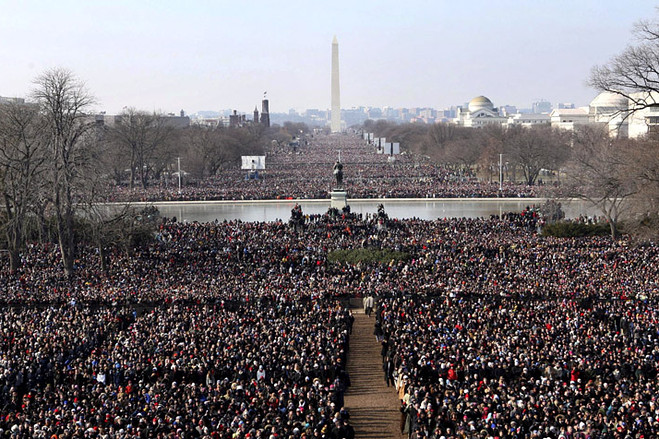 d changed, at least for a few days in DC was that people were exuberant. Strangers became friends. Hugs, high-fives, and tears were shared with neighbors crowding the national mall, cafes, and homes throughout the city. People were generous. An older woman from California gave her flannel shirt to a younger woman who had been waiting beside her in the bitter cold since 6:30 in the morning.
d changed, at least for a few days in DC was that people were exuberant. Strangers became friends. Hugs, high-fives, and tears were shared with neighbors crowding the national mall, cafes, and homes throughout the city. People were generous. An older woman from California gave her flannel shirt to a younger woman who had been waiting beside her in the bitter cold since 6:30 in the morning.
But in some areas where organization was lacking, the chaos vividly showed that when people’s expectations were unfulfilled, survival of the fittest remained the governing natural law. A Congressman reportedly tried to drive through people waiting in line and got stuck in the crowd when they surrounded his vehicle. At least 4 ambulances were seen transporting people injured by the crushing crowd. These scenes resembled a Delhi train station more than the Washington DC I’m used to.
So, what’s changed?
In Richmond Hill, early Sunday morning, another Sikh youth became a victim of a hate crime. Jasmir Singh’s hair and beard were pulled, and he was stabbed in the eye. He may lose his eyesight. [link]
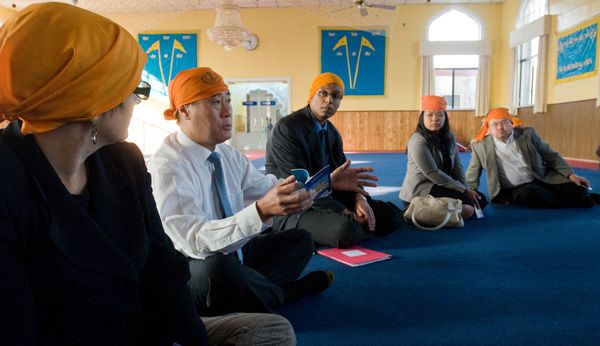
At Stockton’s Sikh Temple on Friday morning, State Sen. Leland Yee, a San Francisco Democrat, asked whether members of the faith identify themselves more as Indians or as Sikhs.
That’s a controversial point, to be honest,” temple representative Sarabjit Singh said.[link]
The question often arises in various discussions. In fact in a recent conversation about the sometimes-called Sikh (pagh salute: GK) Inaugural Ball in DC this week, one commenter lamented:
One thing that I noticed about the Sikhs, is that they always seem to feel underrepresented. By the amount of their rhetoric, a Westerner would probably think that 33% of India is compromised of Sikhs, when in fact, the figure is more like 2%. Also, Sikhs tend to not view themselves as Indians, and apparently, they don’t view themselves as being “desi”. Even this Sikh Inaugural Ball has the headline “Sikhs and Desis Celebrate Obama.” Wait a minute…so Sikhs are exclusive to Desis now?[link]
